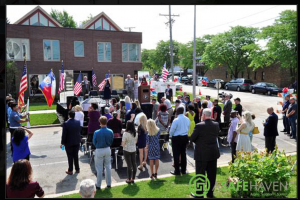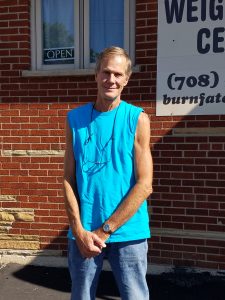Frustrated Hines veterans give up on Melrose Park housing plan
By Jean Lotus Staff reporter — August 8, 2016
Melrose Park’s Veterans Village opened with a ribbon-cutting celebration in June. Funding set-aside mandates mean only one-third of units will actually go to veterans, organizers say. (Photo courtesy of A Safe Haven Foundation)
This summer, formerly homeless Air Force veteran Ron Kubert, 62, experienced a phenomenon he’s encountered too many times with promised veteran services: If it looks too good to be true, something’s wrong.
Kunert was at the end of his yearlong stay at the Catholic Charities-run Cooke’s Manor transitional housing center at Hines VA hospital in Maywood. He was looking to move into his own apartment in July. A caseworker told him about “Veterans Village” in Melrose Park, a spanking new 35-unit development with rent-subsidized one-bedroom apartments. Hines social workers had visited the project and received pamphlets marketing the units to veterans. The project’s website featured images of military dog tags.
But poor customer service and a very small number of units available has disappointed Kunert and about 11 other veterans from Cooke’s Manor who thought the project could benefit them.
“[Veterans Village] seemed like a dream come true, a brand new apartment for $355 a month that wasn’t in the war zone,” Kunert said. “But really, it was like a gas station with a sign that says ‘$2.07’ but with little tiny words underneath that say ‘with car wash.’”
In June, Veterans Village celebrated its grand-opening celebration. The $11 million Melrose Veterans Project covers three city blocks in the 100 blocks of 13th, 14th and 15th avenues near Westlake Hospital, which donated the land.
A festive Flag Day party and open house was held, involving veterans, politicians and food. The Melrose Park Police Color Guard presented a flag ceremony, Mayor Ron Serpico cut a ribbon, the national anthem was sung and veterans from all wars were present.
“Our nation’s returning heroes deserve a place to come home to that meets their unique needs and that of their families,” said Neli Vazquez-Rowland, president of administering not-for-profit, A Safe Haven Foundation.
Serpico declined to return requests for comment for this article.
The project was built in a multi-year private-public partnership financed with a bundle of grant monies and tax credits from various government sources.
And that’s where Kunert’s problems began.
Different layers of public funding come with strings attached. Two-thirds of the units in Veteran Village have already been promised to other categories of residents to comply with government set-asides.
“We have strict criteria we have to meet with different layers of funding,” said Vazquez-Rowland in an interview. “We do have a vet preference, but we don’t have a guarantee for veterans.”
Kunert, who said he receives around $1,050 monthly from Social Security and earns money on the side as a handyman, filled out a five-page application in person and paid off some old debt to improve his credit score. He got a move in-date in July.
He was uneasy when he arrived at the offices with $500 security deposit in-hand but was told the two-bedroom units weren’t available.
According to a plan filed with the Illinois Housing Development Authority, seven units are reserved for former residents of nursing homes who have been given priority after a statewide lawsuit and consent decree.
Kunert said he was told he could rent a three-bedroom unit for $895 a month instead. “That was a big sticker shock,” Kunert said. “But I figured I needed a place and I thought I could probably find a roommate.”

Former U.S. Marine Bill Fernandes is still searching for housing after failing to land a coveted apartment in Veterans Village in Melrose Park. (Photo courtesy of Bill Fernandes)
Kunert said the experience went downhill from there with his move-in date rescheduled twice. Then he received a text saying he was ineligible because — he thinks — his income was too high. The project manager was non-responsive to texts and phone calls, he said.
“There was just too much drama and red flags,” he said. “I found another apartment, but it has much higher rent.”
Other veterans from the area have experienced similar frustrations.
Bill Fernandes, another Cooke’s Manor veteran who served from 1995-99 as a U.S. Marine helicopter mechanic, also received a conditional acceptance letter and quickly upgraded his credit rating by paying off his debts. But then he heard nothing.
“I probably texted and called about 20 times and I never got a response,” he said. “Not even ‘you don’t qualify because you’re too ugly.’”
“I think calling it Veterans Village is completely bogus and manipulative. It’s wrong.”
Fernandes is looking for an apartment, but with shaky credit and a new job he’s discouraged.
“I will find something eventually,” he texted. “I just need to try to come ahead every month instead of living paycheck to paycheck.”
According to a contract with the IHDA, rejected applicants are required to be informed in writing, and told why they were rejected. They are given the right to appeal.
Vazquez-Rowland said the company would work in the future to improve communication and transparency. Hundreds of applicants for the project were all time-stamped, but were administratively too hard to handle individually, she said.
“Unfortunately we don’t have a call center, so we weren’t able to call people if they aren’t accepted.”
Applicants must pass a background screening and a criminal background check. Any felony convictions within the past year, or drug or violent crime convictions within the past 10 years disqualify applicants. Applicants are expected to have less than $5,000 in assets, have not been previously evicted and not exceed maximum income thresholds. This information isn’t on the website, but Vazquez-Rowland said she would make sure it was posted.
It’s “no news is bad news” for 11 other veterans at Cooke’s Manor who have applied and heard nothing.
“Our caseworker just told us all to give up on it and look for something else,” Fernandes said. The site’s website says the project is no longer accepting applications.
“I feel like they wasted our time. [Veterans Village] should never have contacted Hines’ homeless veterans if they didn’t want us in there. Their little pamphlet was false.”
“There are always hurt feelings with these projects, because unfortunately there is such a huge demand,” Vazquez-Rowland said. “We are under restrictions. No one stepped forward and offered to donate millions of dollars to build housing for veterans,” she added. “Fortunately, [A Safe Haven] is always looking to build more projects.”
According to a tenant-selection plan submitted to IHDA, nine units at Veterans Village must be rented to tenants with “extremely low income” or 30 percent of the $76,900 Illinois median income for a family of four ($24,300). Nine units must be rented to tenants with “very low income” 50 percent of the median ($38,450). Seventeen units must be rented to “low income” tenants earning up to 80 percent ($61,500) of the area median.
To qualify for a $1.2 million loan in January from Cook County, eight units are reserved for Housing Choice (formerly Section 8) voucher-holders from Cook County Housing Authority. The CCHA issues “project-based voucher” subsidies.
CCHA Spokeswoman Monique Bond said Housing Choice tenants who’ve already moved in have veteran status.
“Three (possibly four now) veterans have been approved and we are seeking to approve five more,” Bond wrote in an email. “The remaining slots will be assigned to veterans once they meet the criteria.”
When the development is full, between 12 to 15 units — or 33-40 percent — of the Veterans Village will be rented by actual veterans, Vazquez-Rowland said.
Kunert didn’t expect it, but he said he was not surprised.
“If you’re going to use the name Veterans Village, that represents a lot for veterans,” said Kunert. “It’s a marketing scam as far as I’m concerned, at least 51 percent should be veterans.”
Nationally since 2010, the plight of homeless veterans has become a priority for the Obama administration. In December, Obama announced veteran homelessness was reduced by one-third. But there is more work to be done.
Illinois Sen. Mark Kirk serves on the Senate Appropriations Committee, which has budgeted an additional $50 million in veteran HUD Housing Choice vouchers for 2017. Kirk’s office says any veteran who needs assistance can call the Chicago office. “Caseworkers are available to discuss any issues the veterans are having and will provide them access to whatever resources we have,” said Kirk spokesperson Britt Logan.
But some cynical veterans say very little changes.
“Everyone seems to want to appear as if they’re doing something for veterans, but little actually gets done for veterans,” said Virginia Vietnam veteran issue blogger John Lilyea, “Parades and ribbon-cuttings make good press, but that’s usually where politicians and entrepreneurs end their involvement,” he said.
Being used for political show leads to distrust and fatigue for veterans, he said. Some states, such as Massachusetts, have begun to fine charities that fraudulently collect money purportedly for veterans.
“After Vietnam, veterans were ignored, now we’re exploited as part of a marketing plan,” Lilyea said. “Personally, I’d rather be ignored.”
Read the current issue of the Cook County Chronicle
Free digital subscription to the Cook County Chronicle
— Frustrated Hines veterans give up on Melrose Park housing plan –








